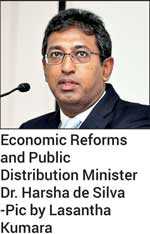Thursday Feb 19, 2026
Thursday Feb 19, 2026
Monday, 25 February 2019 01:41 - - {{hitsCtrl.values.hits}}
By Charumini de silva
In a hard-hitting critique of dragging labour reforms and burgeoning public sector wages, Economic Reforms and Public Distribution Non-Cabinet Minister Dr.Harsha de Silva warned Sri Lanka is sitting on a time bomb of public sector pensions, insisting that strong political will to reform was the only way to defuse it.
Addressing the public seminar titled ‘Making the Employment Laws Conducive for Investments in Sri Lanka’ as the Chief Guest de Silva said the Government has to pay Rs.1 trillion of Rs.1.5 trillion recurrent expenditure next year as public sector salaries and pensions.

“We are going in the wrong direction. Compare these staggering expenses we have to bear for the public sector salaries and pension compared to the Rs.2.1 trillion debt we have to pay next year. However much we try to reform, there is no political will to reform,” he told the seminar organised by National Human Resources Development Council (NHRDC) together with the Institute of Chartered Accountants of Sri Lanka, the International Chamber of Commerce Sri Lanka (ICC) and the Daily Financial Times.
Noting that the average replacement rate globally was around 60%, de Silva said the rate in Sri Lanka was as high as 90%. “In most other countries people contribute towards this pension in the public sector, but in Sri Lanka we contribute nothing. We are sitting on a time bomb and it will soon explode. We cannot continue to be irresponsible this way,” he stressed.
He also said only 10% of the working population is covered by a State pension suggesting that it was crucial to expedite the introduction of a National Pension Scheme to cover all private sector workers including the informal sector workers which is huge in the Sri Lankan economy.
“We have EFP and ETF, but that is also lump sum. It is not that difficult it into an annuity structure — it can be done. People must be brought into these systems in good faith,” he expressed.
Dr. de Silva emphasised that farmer pension and fishermen pension are all political gimmicks and they have all faltered and no longer exists.
“National interest is a good political platform, but we need to be realistic about it and think how we can shift from simple products which are customer-driven to complex products which are producer-driven. You work, you receive a pay and then you must receive a pension of some sort to live,” he said.
The Minister also highlighted the need to ensure there is a way in which we can look after our elderly population.
“Around 20% of our people are going to be over 60 years of age within 10 years and almost 30% of our people are going to be over the age of 60 years by 2050. In this context, who is going to create wealth to look after our parents?” he asked.
He also noted it was unrealistic to be a producer-driven, complex product manufacturer with majority of the students wants to pursue easy subjects such as Buddhist Civilisation, Sinhala, Dance, Media and Political Science.
“Everybody wants to pass exams so, they chose very easy subjects and when graduated they demand the Government to give them jobs. We cannot afford all these people. We want to produce complex products and they must be producer driven. To do that we need skills to compete with other countries. However, the skills we require at Science, Technology, Engineering, and Math (STEM) is not what we are getting,” de Silva pointed out.
At the seminar NHRDC Chairman Dinesh Weerakkody presented proposals to Dr.de silva and Skills Development and Vocational Training Deputy Minister Karunarathna Paranawithana on how to manage the import of labour.
In this complicated labour environment De silva urged the NHRDC and other stakeholders to distil them during the discussions and be realistic without getting stuck to papers and forums to bring in good policies.
“There are so many foreign workers in this country, where most of them are from India, Bangladesh, Nepal and China. Whether it is right or wrong foreign workers are here. I think it was timely by the NHRDC to start working on regulations, so that instead of free-for-all and problems later on, we have some regulatory framework and laws to control the inflow of foreign people,” he said.